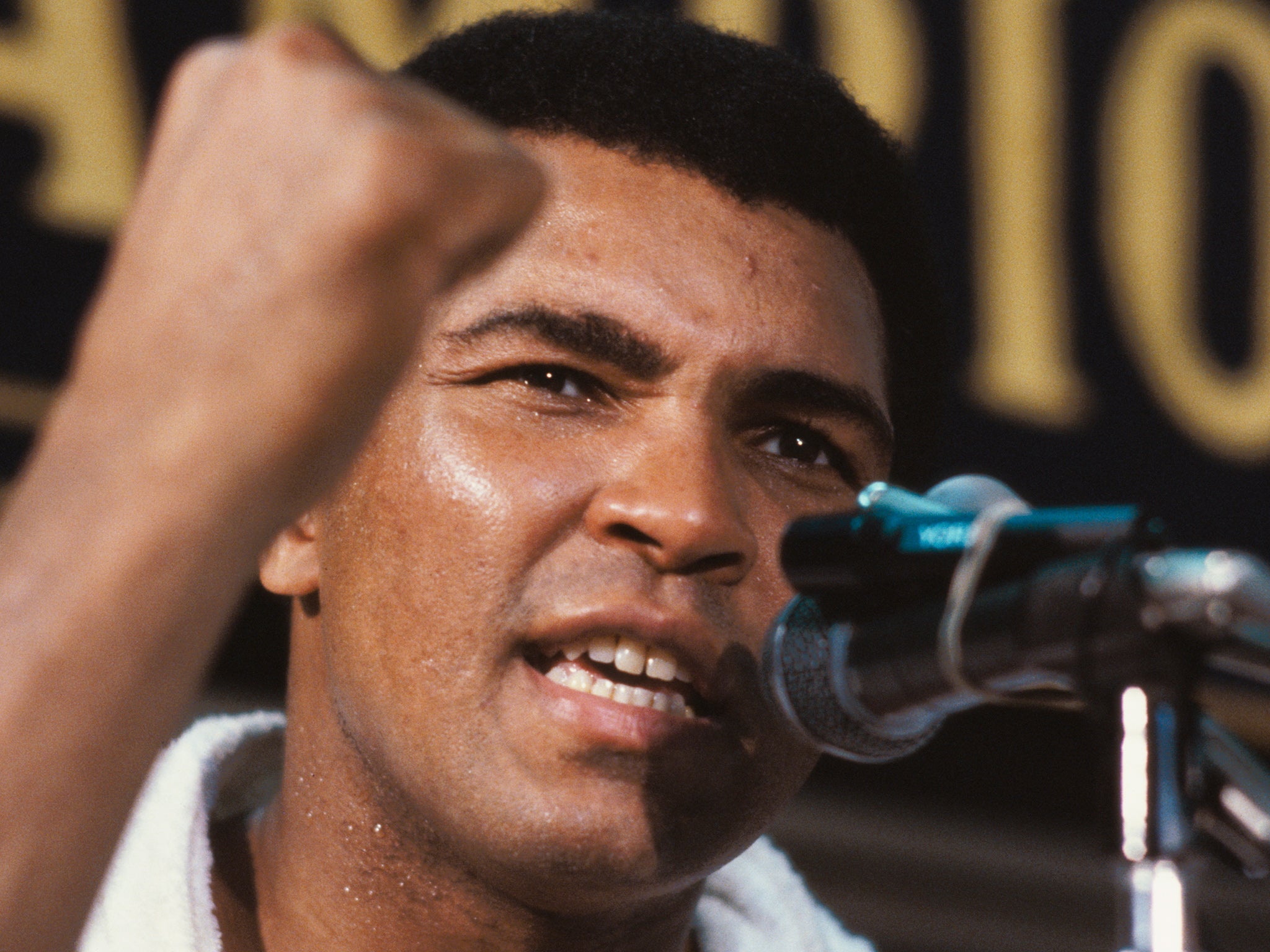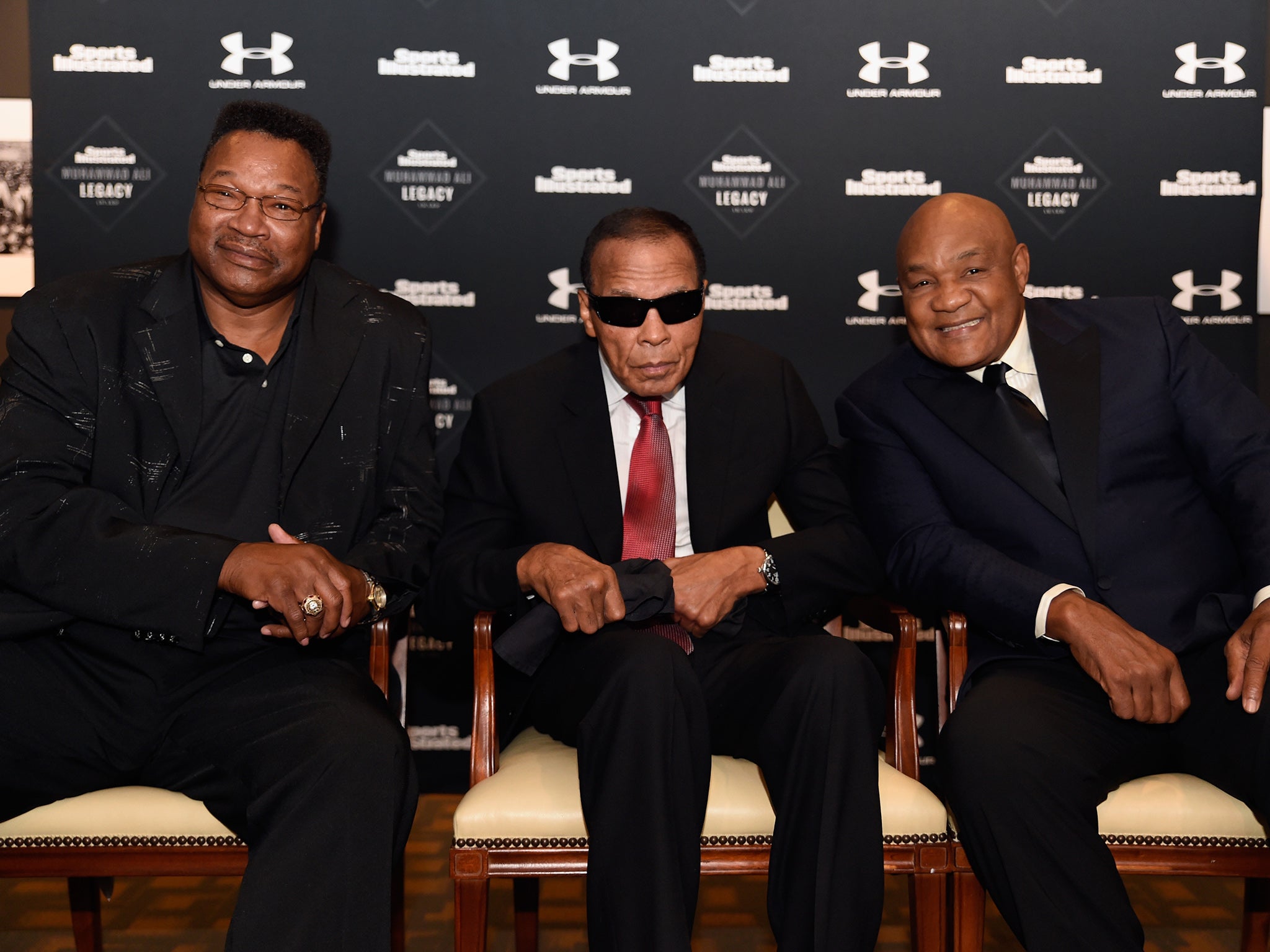Muhammad Ali: The champion who fought against the dying of the light
It was a privilege to encounter Ali beyond the newsprint and film footage, even as his powers in the ring waned

Your support helps us to tell the story
From reproductive rights to climate change to Big Tech, The Independent is on the ground when the story is developing. Whether it's investigating the financials of Elon Musk's pro-Trump PAC or producing our latest documentary, 'The A Word', which shines a light on the American women fighting for reproductive rights, we know how important it is to parse out the facts from the messaging.
At such a critical moment in US history, we need reporters on the ground. Your donation allows us to keep sending journalists to speak to both sides of the story.
The Independent is trusted by Americans across the entire political spectrum. And unlike many other quality news outlets, we choose not to lock Americans out of our reporting and analysis with paywalls. We believe quality journalism should be available to everyone, paid for by those who can afford it.
Your support makes all the difference.Now that he is dead, all those, dark lost years after the flame burnt most brightly, the difficult trick is to remember that he was something more tangible than the work of a fabulous imagination.
It helps if you had the privilege of some contact that took you beyond the sepia newsprint and the grainy film of his incandescent youth.
If, for example, you were able to walk down a New York street on a bright summer morning and see how he brought a most self-regarding city to a halt, or be let into his dressing room as he prepared for a fight that would define his raw nerve and courage more than his ineffable grace and skill, or had breakfast with him as he prepared for his last significant contest, when he knew - for all his protestations - that the light was drawing in.
That last instance came in the early summer of 1980 when he worked in his Deer Lake training camp, up in the Amish country of Pennsylvania.
He pined for the old levels or recognition. He insisted that all those writers and TV people who had failed to make the trek from New York and Los Angeles and across the world were missing the story of his greatest redemption - something to overshadow even the Thrilla in Manila, when he overcame, for all time, his ferocious rival Joe Frazier, and the Rumble in the Jungle, when George Foreman was overwhelmed by his craft and his genius and the mind of the world was pummelled to the point of shock. Only he didn’t say the world was shocked, he used a rather earthier description of its condition.
He said that he would ‘whup’ his former sparring partner Larry Holmes when the fight was staged in Las Vegas in the fall. “Poor Larry Holmes,” he said, “will be paralysed. He will look across the ring and he will see me and then he will think, ‘What I am doing here?’ He will know how out of place he is - just like Jimmy Ellis (another former sparring partner who would win a world title) when he dreamt he beat me, then came in to the gym to tell me and apologise.”
There were, inevitably, peals of laughter, but the longer Ali talked about his forthcoming resurrection, the more you realised the great fighter had moved deeply, irrecoverably, in the last act of a tragedy, which in both its glory and its pain, boxing would never surpass.
In Las Vegas strong men cried when Holmes pounded Ali for 10 rounds before his trainer Angelo Dundee, brushing aside the objections of Herbert Muhammad, the Black Muslim manager, threw in the towel. Dundee also had tears in his eyes and later he said, “Sometimes you experience things that seem just too hard to bear.”
For Dundee, the superbly quick-thinking corner-man who 15 years earlier had rescued his charge from Henry Cooper’s left hook ambush in London and who had brilliantly helped shape the craft and tactical understanding of the young fighter from Louisville, the greatest burden now was his understanding that Ali had lost forever a uniquely supreme capacity.
It was described by the sportswriter Hugh McIlvanney, who had covered the full sweep of Ali’s career with a fine observation and unbeatable eloquence, which was something to say when you considered his rivals included the extremely high-rent novelist Norman Mailer.
McIlvanney wrote that Ali had the miraculous ability to look into the mirror each morning and re-invent himself. But no longer, it was clear enough on that painful night in the grounds of Caesar’s Palace. There, the deceits of the summer back in Deer Lake were brutally, terminally punished. He looked beautiful in the training camp and in the ring but the truth was that at 38 years of age he had become a shell, empty of everything but the pride that persuaded him that he could not quit as Holmes bored in, quite relentlessly. Holmes said later that he had agonised before throwing each blow but if it was true no-one had ever concealed so well in the ring the dangerous possiblities of compassion.

In Deer Lake, fussed over by his devoted entourage, Ali was spellbinding over the breakfast table. Yes, he would rise again - he would once again confound the world. Holmes, the poor sap, would be the latest to submit to his force, his wit, his perfectly honed understanding of the terms of combat. “Holmes is a strong fighter but he is heading for strange country.”
Sadly, it was the great man who was approaching the darker terrain.
Around this time he had appeared at the Sugar Ray Leonard-Roberto Duran fight in Montreal and was clearly much taken with the possibilities of the collision between the clinically gifted Leonard and the remorseless Duran.
“There is nothing like a fight like this,” said Ali. “It stops the world. For a few minutes it happens at the centre of the world. Everyone wants to know ‘who’s gonna win, who’s gonna win.’ It’s like chasing a pretty girl. You dress yourself up, you slap on the cologne. All you want is that pretty girl but then when it is over the world begins again.”
Ali was working on the illusion that he was still in the chase but for so many another reality had descended some years earlier.
It came in 1977 at Madison Square Garden when Ali retained his world title but at the expense of tremendous punishment from Earnie Shavers, the heavy-hitting Acorn Man from Ohio.
The fight went 15 rounds and Ali won a unanimous verdict but not before taking shots which seemed to shake the building. Later, in his dressing room, he screamed for the lights to be turned off. He said they were like needles in his eyes. The camp doctor, Ferdie Pachecho, swore that it would be the last time he was in the great man’s corner. “You’re taking punishment,” he said, “which you will feel forever. You’re being hurt in your head, all over your body, right down to your bowels.”
It was a bleak but impeccably prophetic verdict and in the wake of the fight there came another damning assessment. It was from John Condon, the Garden match-maker. He said, “I never thought I’d live to see the day when Muhammad Ali’s greatest asset was his ability to take a punch.”
In the last analysis it was an asset which became a ruinous liability, something that could hardly have been imagined in the days of his great pomp, those triumphant times he when laughed at the world and, from time to time, himself.
Certainly there was much poignancy the other day when his brother, Rahman Ali, suggested that his brother could die at any moment and also reported that he had some time ago dictated his own gravestone epitaph.
“I tried to love someone,” it starts, and goes on, “I did try to feed the hungry. I did in my life try to clothe those who were naked. I want you to say that I tried to serve and love humanity.”
He made a cake of human happiness, he filled it with kindness and all the good fruit of the world.
Yes, of course, Muhammad, but he also thrilled the world in so many uncharted ways. He did it with courage and humour and always a sense that nothing was impossible if you had enough spirit, enough heart.
When he still seemed like the most impregnable man on earth, I asked him for a little preview of his gravestone notice. He went on for several minutes. The opening lines were not too prepossessing, along the lines of “He made a cake of human happiness, he filled it with kindness and all the good fruit of the world.” No doubt he noticed that attention began to wane but he went on for several more minutes in the same vein. Then he glowered and demanded, “Read that back.”
He was the master of so many arts and not least a terrifying mischief.
Join our commenting forum
Join thought-provoking conversations, follow other Independent readers and see their replies
Comments